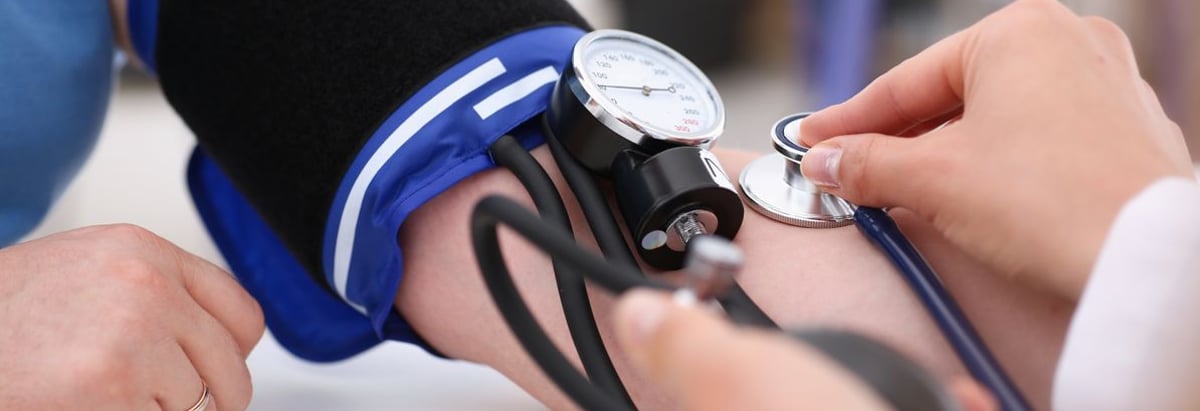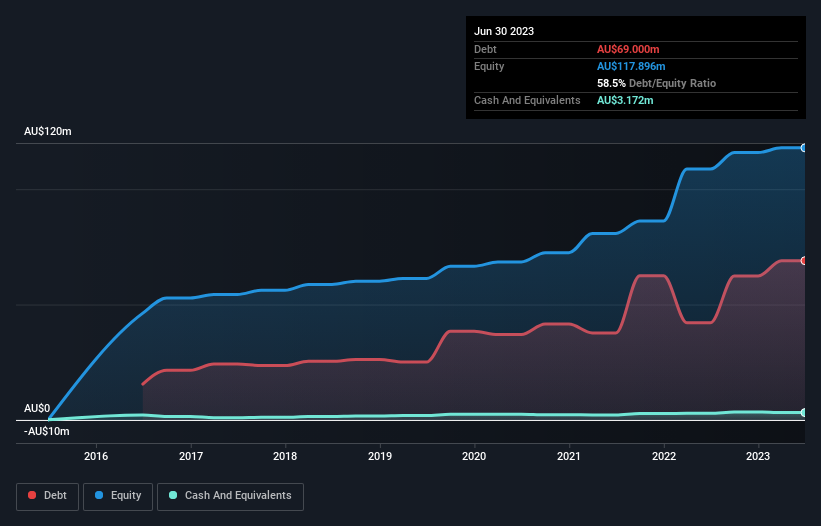- Australia
- /
- Healthcare Services
- /
- ASX:AHX
These 4 Measures Indicate That Apiam Animal Health (ASX:AHX) Is Using Debt Extensively

Legendary fund manager Li Lu (who Charlie Munger backed) once said, 'The biggest investment risk is not the volatility of prices, but whether you will suffer a permanent loss of capital.' So it seems the smart money knows that debt - which is usually involved in bankruptcies - is a very important factor, when you assess how risky a company is. We can see that Apiam Animal Health Limited (ASX:AHX) does use debt in its business. But the real question is whether this debt is making the company risky.
When Is Debt Dangerous?
Debt and other liabilities become risky for a business when it cannot easily fulfill those obligations, either with free cash flow or by raising capital at an attractive price. If things get really bad, the lenders can take control of the business. While that is not too common, we often do see indebted companies permanently diluting shareholders because lenders force them to raise capital at a distressed price. Having said that, the most common situation is where a company manages its debt reasonably well - and to its own advantage. The first thing to do when considering how much debt a business uses is to look at its cash and debt together.
See our latest analysis for Apiam Animal Health
What Is Apiam Animal Health's Net Debt?
The image below, which you can click on for greater detail, shows that at June 2023 Apiam Animal Health had debt of AU$69.0m, up from AU$42.1m in one year. However, because it has a cash reserve of AU$3.17m, its net debt is less, at about AU$65.8m.

How Strong Is Apiam Animal Health's Balance Sheet?
According to the last reported balance sheet, Apiam Animal Health had liabilities of AU$33.3m due within 12 months, and liabilities of AU$94.9m due beyond 12 months. Offsetting this, it had AU$3.17m in cash and AU$14.0m in receivables that were due within 12 months. So it has liabilities totalling AU$111.0m more than its cash and near-term receivables, combined.
This deficit casts a shadow over the AU$54.0m company, like a colossus towering over mere mortals. So we definitely think shareholders need to watch this one closely. After all, Apiam Animal Health would likely require a major re-capitalisation if it had to pay its creditors today.
In order to size up a company's debt relative to its earnings, we calculate its net debt divided by its earnings before interest, tax, depreciation, and amortization (EBITDA) and its earnings before interest and tax (EBIT) divided by its interest expense (its interest cover). The advantage of this approach is that we take into account both the absolute quantum of debt (with net debt to EBITDA) and the actual interest expenses associated with that debt (with its interest cover ratio).
Weak interest cover of 1.7 times and a disturbingly high net debt to EBITDA ratio of 5.4 hit our confidence in Apiam Animal Health like a one-two punch to the gut. The debt burden here is substantial. Investors should also be troubled by the fact that Apiam Animal Health saw its EBIT drop by 16% over the last twelve months. If that's the way things keep going handling the debt load will be like delivering hot coffees on a pogo stick. When analysing debt levels, the balance sheet is the obvious place to start. But it is future earnings, more than anything, that will determine Apiam Animal Health's ability to maintain a healthy balance sheet going forward. So if you're focused on the future you can check out this free report showing analyst profit forecasts.
Finally, a company can only pay off debt with cold hard cash, not accounting profits. So we always check how much of that EBIT is translated into free cash flow. Over the last three years, Apiam Animal Health actually produced more free cash flow than EBIT. There's nothing better than incoming cash when it comes to staying in your lenders' good graces.
Our View
To be frank both Apiam Animal Health's interest cover and its track record of staying on top of its total liabilities make us rather uncomfortable with its debt levels. But on the bright side, its conversion of EBIT to free cash flow is a good sign, and makes us more optimistic. It's also worth noting that Apiam Animal Health is in the Healthcare industry, which is often considered to be quite defensive. Overall, it seems to us that Apiam Animal Health's balance sheet is really quite a risk to the business. For this reason we're pretty cautious about the stock, and we think shareholders should keep a close eye on its liquidity. The balance sheet is clearly the area to focus on when you are analysing debt. But ultimately, every company can contain risks that exist outside of the balance sheet. Be aware that Apiam Animal Health is showing 4 warning signs in our investment analysis , and 1 of those shouldn't be ignored...
When all is said and done, sometimes its easier to focus on companies that don't even need debt. Readers can access a list of growth stocks with zero net debt 100% free, right now.
New: Manage All Your Stock Portfolios in One Place
We've created the ultimate portfolio companion for stock investors, and it's free.
• Connect an unlimited number of Portfolios and see your total in one currency
• Be alerted to new Warning Signs or Risks via email or mobile
• Track the Fair Value of your stocks
Have feedback on this article? Concerned about the content? Get in touch with us directly. Alternatively, email editorial-team (at) simplywallst.com.
This article by Simply Wall St is general in nature. We provide commentary based on historical data and analyst forecasts only using an unbiased methodology and our articles are not intended to be financial advice. It does not constitute a recommendation to buy or sell any stock, and does not take account of your objectives, or your financial situation. We aim to bring you long-term focused analysis driven by fundamental data. Note that our analysis may not factor in the latest price-sensitive company announcements or qualitative material. Simply Wall St has no position in any stocks mentioned.
About ASX:AHX
Apiam Animal Health
A vertically integrated animal health company, provides veterinary products and services to production and companion animals, and equine in Australia.
Undervalued moderate.
Market Insights
Community Narratives



